In truth, there are several elections on the August 2nd ballot in Shelby County.
One is a county general election, featuring contests for Shelby County mayor, sheriff, and various other county official positions, as well as for members of the Shelby County Schools board and Shelby County Commission, special elections for three judgeships, as well as a referendum on pay raises for county officials. And, for roughly half the voters of Memphis, a contest for an open at-large position on the City Council.
Another election, involving primaries for major statewide and federal offices, includes races for governor, U.S. senator, the U.S. House of Representatives, and legislative positions in the Tennessee General Assembly.
The outcomes of the county general election and the state/federal primaries will not only be consequential in themselves but will have significant barometric relevance to ongoing political currents — local, statewide, and even national. In particular, the most closely watched races will indicate the extent to which the current century’s ramparts of Republican dominance in Tennessee and Shelby County are still at full strength or whether, conversely, the much-rumored “blue wave” of 2018 will signal a Democratic revival.
Certainly, a Democrat — Lee Harris — is regarded as having a fair chance to prevail as Shelby County mayor, the first to do so since two easy victories in 2002 and 2006 by former county and city Mayor A C Wharton. Harris is a former Memphis city councilman and, more recently, the elected leader of the Democrats’ five-member remnant in the state Senate. He is opposed by David Lenoir, a two-term county trustee, who won a three-cornered Republican primary over County Commissioner Terry Roland and Juvenile Court Clerk Joy Touliatos in May.
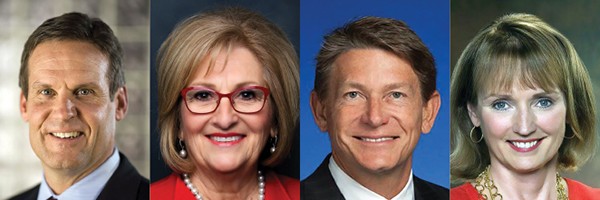
GOP: Bill Lee, Diane Black, Randy Boyd, and Beth Harwell
The root fact is that the August 2nd county ballot will be the first real test this year of Democrats against Republicans, and might provide a measure of the respective prospects for either party in the months and even years to come.
As it happens, of course, balloting in the county general election, as well as in the state/federal primaries, is already underway, in an official early voting period that began last Friday, July 13th, and will continue through Saturday, July 28th.
And, because of a controversy over the Shelby County Election Commission’s choice of voting sites that flared up in the couple of weeks before the process started [see Editorial, p. 8], public attention to the process of early voting was whetted to an unprecedented degree.
By the time the controversy was resolved in the courtroom of Chancellor JoeDae L. Jenkins, Democrats and Republicans had seen early voting sites added in pockets of the county dominated by their constituents. The final number of sites was 27, fairly evenly distributed, and five of those sites — also apportioned equably party-wise — were enabled to operate for an extra three days each.
When the Shelby County Democrats for Change PAC held a reception and rally for party candidates in the Serenity Events Center in East Memphis on Sunday, the organizers proudly claimed a 68 percent to 32 percent voting ratio in favor of the Democratic state/federal primary versus the Republican one for Friday’s first day of early voting. If that kind of differential should continue and be reflected in the voting results of the county general election, chances for the putative blue wave would be looking good.

DEM: Karl Dean and Craig Fitzhugh
The two mayoral contestants will have had several public one-on-one matchups by the time final voting ceases on Election Day. In the first one, held last month at a meeting of the Downtown Kiwanis Club, Republican Lenoir seemed to gain some traction by selectively using Democrat Harris’ legislative record to make a “soft-on-crime” attack.
In the candidates’ second major encounter, held last week by the NAACP and the ad hoc Voting is Power 901 activist group at the National Civil Rights Museum, Harris made pointed efforts to rebut Lenoir’s charge and clearly found the environment more hospitable to his own message of progressive social change. Score it one-to-one as the opponents prepared to square off again this week before the Downtown Rotary Club.
Though this potentially nip-and-tuck mayoral contest will have exposed the two parties’ contrasting attitudes, the real battle was taking place in the political center.
Lenoir’s pitch, based essentially on his claim of demonstrated competence, was centrist enough, his supporters hoped, to give him the same shot at independents and Democratic crossovers that current GOP Mayor Mark Luttrell enjoyed in two elections. Similarly, Harris’ professional gloss as a Yale Law graduate and his record in office of simultaneously working across the political aisle, and pursuing cutting-edge Democratic goals gave him a good chance to activate his base, demographically presumed to be a majority, while discouraging crossovers the other way.
Even the race for sheriff, not normally one characterized by political extremes, has a discernibly ideological edge this year, as was demonstrated by another NAACP/VIP901 debate last week, this one between Chief Deputy Floyd Bonner, the Democrat, and county homeland security director Dale Lane, the Republican.
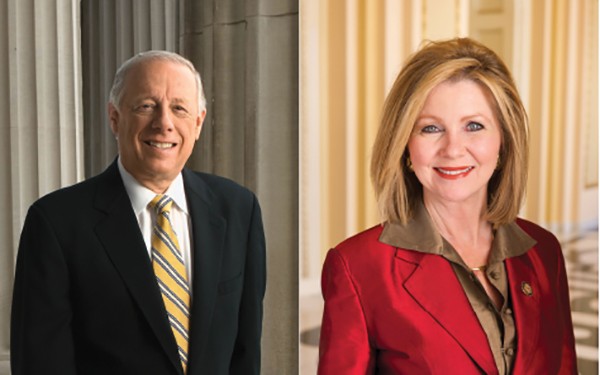
Phil Bredesen and Marsha Blackburn
Among other issues, Bonner’s declared disinclination to cooperate with the Trump administration’s roundups of undocumented immigrants, locally, contrasted with Lane’s professed willingness to assist the operatives of ICE (Immigration and Customs Enforcement) officials as “fellow law officers.” (See Politics, p. 7, for more.)
Consistent with the blue wave theme, the August 2nd election ballot shows three Democrats running for the office of governor, and only one of them — political unknown Mezianne Vale Payne — has the look of a ringer. The other two Democrats — former Nashville Mayor Karl Dean and outgoing Democratic state House Leader Craig Fitzhugh — are major league, all the way.
Most analysts see Dean as the clear favorite, on the basis of his financial edge and backing from traditionalists in the party network, though Fitzhugh has the declared support of party legislators, educators, state employees, and various other rank-and-file groups.
There are three Democrats vying in the party primary for the U.S. Senate, too, and one of them is former two-term Governor Phil Bredesen. His party rivals, for the record, are named Gary Davis and John Wolfe, but there is no mystery about who the Democratic nominee will be. Bredesen not only has wall-to-wall support from rank-and-file Democrats in Tennessee, he is counted on by national Democrats of all persuasions to contribute mightily to the party revival that Democratic optimists (and numerous media analysts) have been forecasting.
And, just as there is no mystery about Bredesen’s looming victory in the Democratic primary, the identity of his Republican adversary in November, U.S. Representative Marsha Blackburn of Tennessee’s 7th Congressional district, is also a given, though one Aaron L. Pettigrew also has his name on the primary ballot. Blackburn, who occupies a position on the hard right of the Republican Party, was a Trumpian before there was a Trump, and her all-too-obvious intent to move on to the Senate was probably a major factor last year in convincing incumbent Senator Bob Corker, a Trump critic, that it was time to bow out.
There is something of a coin-toss situation among Republican gubernatorial candidates.. Considering the fact that three of the six GOP aspirants — entrepreneur and former state economic development Commissioner Randy Boyd, 6th District U.S. Representative Diane Black, and Williamson County businessman Bill Lee — are multi-millionaires, that metaphor is almost literal. The fourth serious candidate in the GOP primary, state House Speaker Beth Harwell, has been hampered by her relative lack of financial resources.
Though only Black has a political profile arguably close to Trump’s (she’s an advocate for building “the wall” on the nation’s southern border, and she veers hard right on most other issues), all of the Republicans call themselves “conservatives” and are at pains not to put too much public distance between themselves and the president.
Boyd, in particular, seems determined in that respect, running ads that seem designed to depict him as more rigidly conservative than Black, though in person he is soft-spoken and thoughtful, a near clone in his thinking to current Governor, Bill Haslam, for whom Boyd designed such arguably forward-looking programs as Drive to 55 and Tennessee Promise.
Lee, a genial man who campaigns heavily on his Christian faith and his rebound from family tragedies, is clearly a generic conservative, though one with few hard and fast positions. By general consensus (and such reliable polling data as exists), he has been running third and hoping for a stumble by one or both of the acknowledged GOP front-runners, Boyd and Black.
There are those who see Lee’s real purpose as building a profile for some future race. Harwell’s is more a case of sink-or-swim in a possible last hurrah, though she is well-liked enough to be called upon for further public duty, possibly by someone’s appointment.
In any case, Bredesen vs. Blackburn and the eventual gubernatorial matchup in November will measure the contrary tides of political sentiment in Tennessee. Apropos prospects for a blue wave, a look at the legislative races on the ballot, with Democrats vying for every available position and there being numerous races for which no Republican is contending, would almost suggest that Shelby County has returned to the circumstances of the old Solid Democratic South of the pre-civil rights era, in which the GOP was an outlier party.
That, to say the least, would be misleading. What the dearth of Republican candidacies, almost entirely in predominantly black areas, does represent, however, is a continuing lack of indigenous support in the inner city of Memphis, as well as a serious downturn in the party’s outreach results, whether through lack of serious effort or simple failure. In theory at least, the party is still trying, as would be indicated by the presence on the GOP ballot once again of Charlotte Bergmann, an African-American activist and a perennial candidate, once again seeking the 9th District Congressional seat.
The omnipresence of Democratic legislative candidates, meanwhile, signals a rekindled zeal among rank-and-file Democrats as well as in the leadership of a local party which was reorganized in 2017, after internal disunion and chaos resulted in the state party’s lifting its charter in 2016.
Longtime observers of local and state politics recall a time in the 1950s and 1960s when the Republican Party, then a definite minority organization in both Shelby County and Tennessee at large, began fielding candidates in established Democratic fiefdoms. Largely unsuccessful at first, the GOP efforts eventually bore fruit, and, when social changes (most of them national in origin) began to weaken ancestral voting habits, today’s wall-to-wall GOP state government emerged.
Locally, though, the situation is far from being static. It should be remembered that the Republican sweeps and near-sweeps in the county elections of the 21st century are counter-demographic, in that they have occurred at a time when Shelby County’s emergent non-white majority has been ever enlarging. If the new flood of Democratic candidates in the suburbs can stimulate a dormant activism there and meanwhile activate the party’s urban base, generally somnolent in non-presidential election years, the political power ratio could transform quickly.
Or, as Shelby County Republican chairman Lee Mills put it, in a cautionary message to his party-mates back in February: “Since 2010, we’ve been lucky in Shelby County. Thanks to the leadership we’ve had, we’ve had good organization and we’ve had good candidates. The Democrats, on the other hand, have had just the opposite. They haven’t had good candidates and they haven’t had good organization. But for the first time in a long time, they have both of those things. They have a good organization. They have a good leader. And they have decent candidates at the top that’ll drive all the way down to the bottom. So we have got to turn our voters out.”
There are three state Senate seats at risk in the primary, and there are interesting contests in all of them:
In State Senate District 29, Tom Stephens is a token Republican entry. The real race is in the Democratic primary, between outgoing County Commissioner Justin Ford, a member of urban Memphis’ best-known political clan, and current state Representative Raumesh Akbari, a rising legislative star who won her House seat in a 2013 special election over Ford’s cousin, Kemba Ford.
Three Democrats are on the ballot in Senate District 31, where David Weatherspoon, a chaplain at Le Bonheur Hospital, seeks the party nod over Gabby Salinas, a cancer survivor and scientific researcher. A third Democrat is M. Rodanial Ray Ransom.
Salinas’ history of personal triumph over difficult odds makes for a compelling backstory, but Weatherspoon has a serious financial edge and support across party lines. Both Weatherspoon and Salinas are committed to supporting Medicaid expansion, which Republican incumbent Brian Kelsey, unopposed in his primary, has stoutly resisted.
No Republican is running in Senate District 31, perhaps because Democratic incumbent Reginald Tate is well-known for his close cooperation with the GOP leadership in the legislature. That fact has also generated a stout challenge to Tate in the Democratic primary from nursing entrepreneur Katrina Robinson, who is supported by several name Democrats, including current state Senators Sara Kyle and Lee Harris.
Of Shelby County’s 13 seats in the House of Representatives, only five have races on the ballot, and all these races are between rival Democrats. In House District 85, there is a four-way contest involving Jesse Chism, Ricky Dixon, Brett N. Williams, and Lynette P. Williams. In House District 86, long-term Democratic incumbent Barbara Cooper has two primary opponents: Amber Huett-Garcia and Jesse Jeff. In House District 90, things begin to get truly interesting. Here incumbent John DeBerry — who, like the aforementioned Reginald Tate, is considered by many of his party-mates to be too cozy with Republicans — is challenged by Torrey Harris, a small-business owner.
House District 91, vacated by Akbari, is being fought over by Democrats Doris DeBerry Bradshaw, Juliette Eskridge, and London P. Lamar, while House District 93 incumbent Democrat G.A. Hardaway has a contender in the Democratic primary, Eddie Neal. In House District 99, Antonio “Two-Shay” Parkinson, is being challenged by fellow Democrat Johnnie Hatten.
House District 99 has a special distinction as a result of the recent untimely death of Republican incumbent Ron Lollar. It was too late to change the ballot; so Lollar’s name remains. Before the November election, the Shelby County Republican Party will be entitled to name a replacement. Some of the Republican names in play: county commission Chair Heidi Shafer, Shelby County GOP Chair Mills, Bartlett Alderman David Parsons, and County Commissioner David Reaves.
And David Cambron, the Democratic mainstay and ace recruiter who is as responsible as anyone for the stepped-up party showing, has a shot at winning a seat himself. He’s unopposed to be the Democratic nominee in House Disrict 99.See ‘Politics,’ , for more election preview.
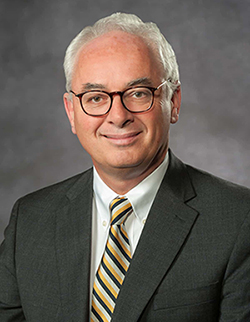
 JB
JB 


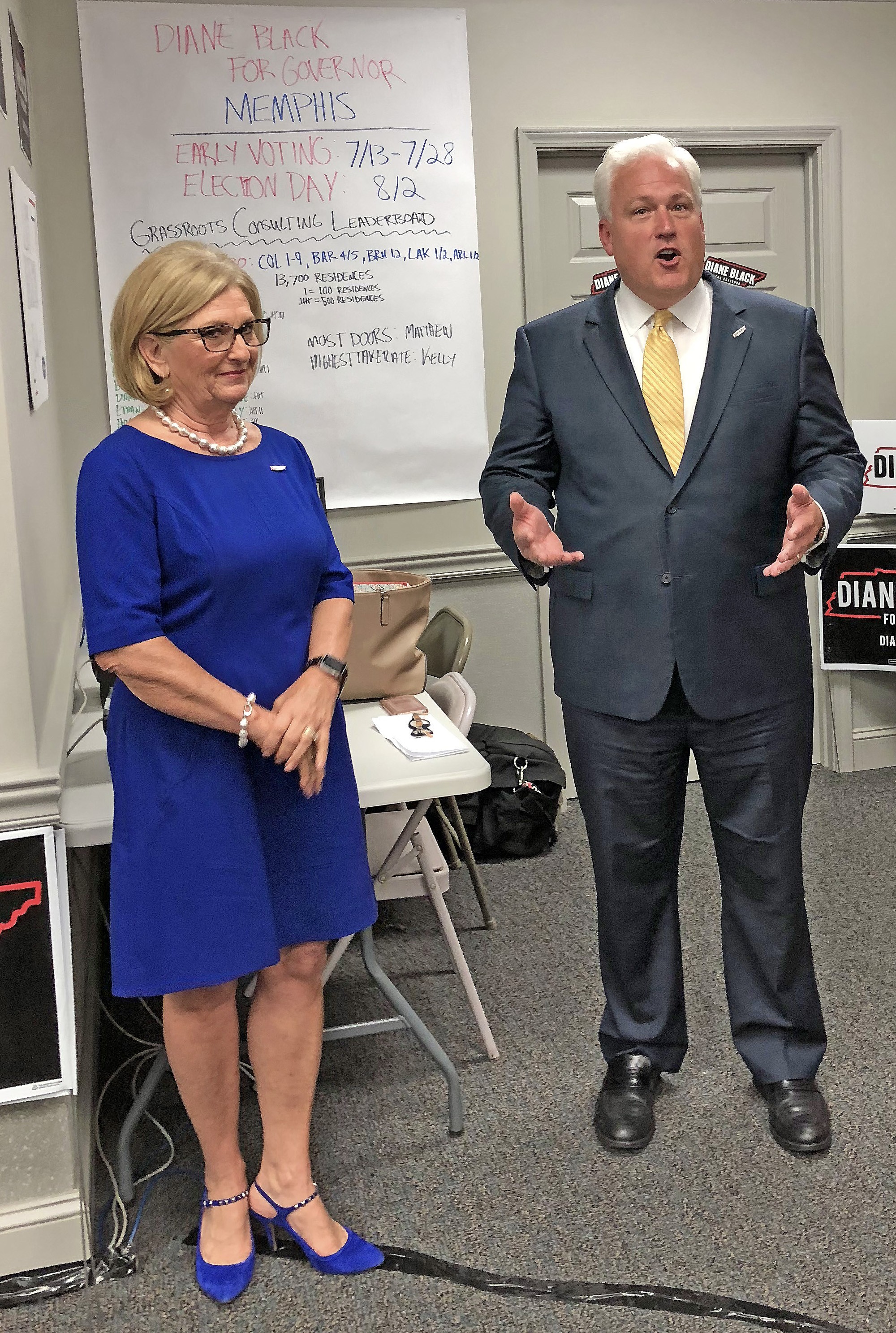 JB
JB 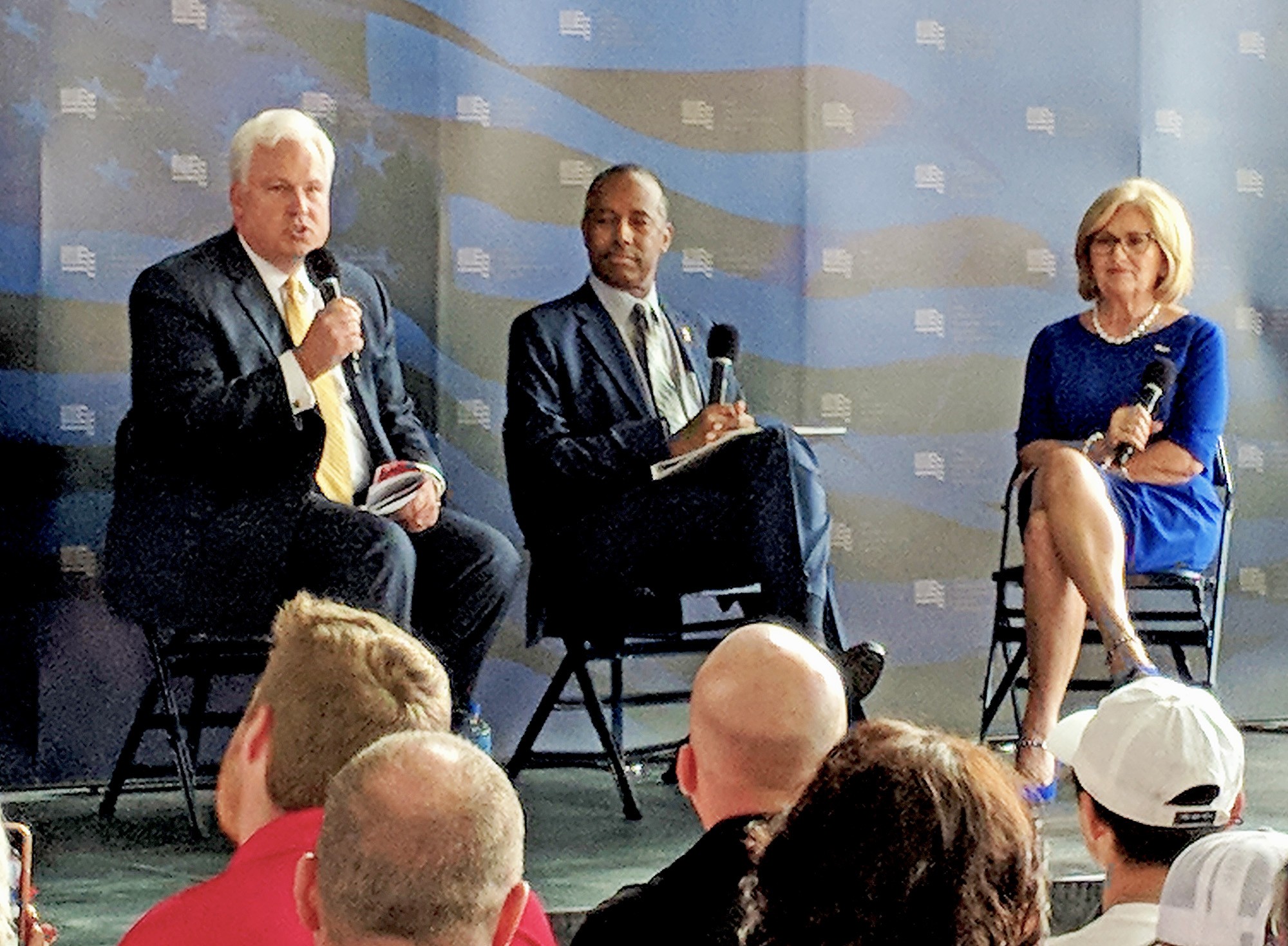
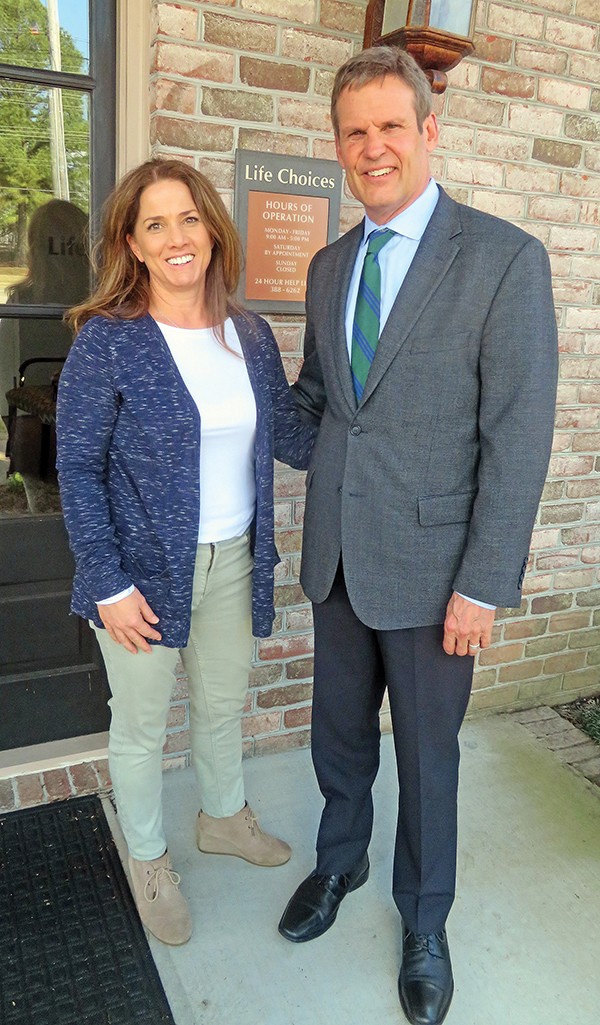 Jackson Baker
Jackson Baker  JB
JB